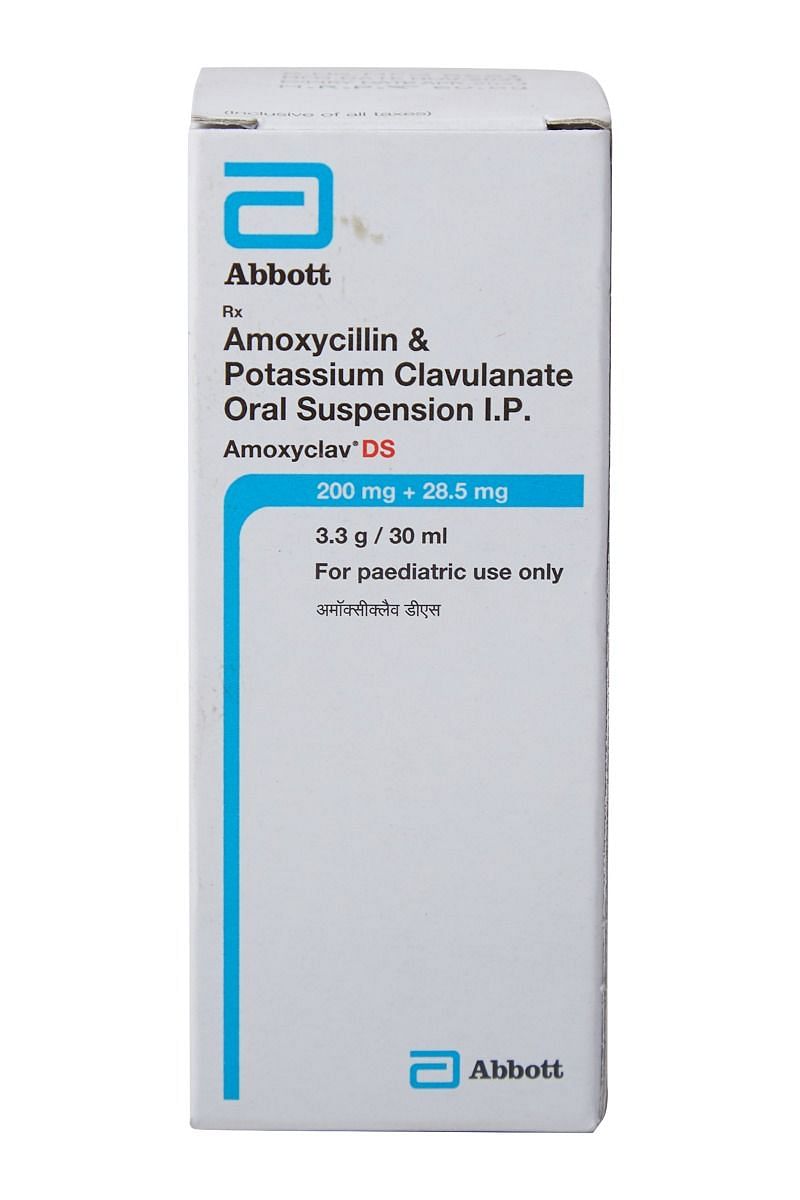
US Clave Dry Syrup
Manufacturer
Suave Healthcare Pvt Ltd
Salt Composition
Amoxycillin (200mg) + Clavulanic Acid (28.5mg)
Key Information
Short Description
US Clave Dry Syrup is an antibiotic medicine that helps treat bacterial infections of the ear, nose, throat, chest, lungs, teeth, skin, and urinary tract.
Dosage Form
Dry Syrup
Introduction
US Clave Dry Syrup is an antibiotic medicine that helps treat bacterial infections of the ear, nose, throat, chest, lungs, teeth, skin, and urinary tract. It is capable of killing bacteria that have become resistant to other therapies and thus also helps treat tuberculosis that is resistant to other treatments.
Directions for Use
Your child must complete the entire course of antibiotics. Stopping too soon may cause the bacteria to multiply again or cause another infection.
Safety Information
Side Effects
Bitter taste in the mouth Diarrhea Itchy rash Facial swelling Breathing difficulty
How it works
US Clave Dry Syrup is an antibiotic. It has two active agents amoxycillin and clavulanic acid. Amoxycillin works by preventing the formation of the bacterial protective covering (cell wall) essential for the survival of the bacteria. Whereas clavulanic acid serves a special purpose of inhibiting an enzyme (beta-lactamase) that is produced by resistant bacteria.
Quick Tips
Your child must complete the entire course of antibiotics Encourage your child to drink plenty of water in case diarrhea develops as a side effect Never give US Clave Dry Syrup until and unless prescribed by the doctor Do not give US Clave Dry Syrup to treat common cold and flu-like symptoms caused by viruses Check ‘expiry’ before giving US Clave Dry Syrup to your child
Related Medicines

Moxikind-CV Dry Syrup

Amoxyclav Dry Syrup

Advent 228.5mg Dry Syrup Tangy Orange

Clavico Dry Syrup

Aldomox Dry Syrup

Clavica Dry Syrup

Xylum Dry Syrup

Duet DS Dry Syrup

Moroxil CV Dry Syrup

S Mocy CL Dry Syrup
Frequently asked questions
Can other medications be taken alongside US Clave Dry Syrup?
US Clave Dry Syrup may interact with other medications or substances. It is essential to inform your child's doctor about any other medications they are taking before starting US Clave Dry Syrup. Additionally, consult the doctor before administering any medication to your child.
Can my child receive vaccinations while on treatment with US Clave Dry Syrup?
Antibiotics like US Clave Dry Syrup usually do not interfere with vaccine ingredients or cause adverse reactions in children who have just been vaccinated. However, it is recommended that children taking antibiotics should wait until they recover from the illness before receiving a vaccination.
Which lab tests may be necessary for my child during long-term treatment with US Clave Dry Syrup?
Prolonged therapy may require regular monitoring of kidney and liver function tests to ensure your child's condition remains stable.
Is it safe to give a higher dose of US Clave Dry Syrup than recommended?
No, administering a higher dose of this medication can increase the risk of side effects. If your child experiences increased severity of symptoms, consult with their doctor for re-evaluation.
Can I stop giving US Clave Dry Syrup to my child once their symptoms have improved?
No, it is essential not to discontinue treatment unless the full course of therapy is complete, even if you feel better. The symptoms may improve before the infection is fully cured. Therefore, continue administering the medication for the prescribed duration as it may still provide beneficial effects.
Can US Clave Dry Syrup cause diarrhea?
Yes, this medication can cause diarrhea due to its antibiotic properties that kill harmful bacteria and potentially affect helpful bacteria in your child's stomach. If diarrhea occurs, encourage your child to drink plenty of water or other fluids. Consult a doctor if diarrhea persists and you notice signs of dehydration such as reduced urination with dark-colored and strong-smelling urine.
Do all viral common colds result in secondary bacterial infections?
Most of the time, bacterial infections do not follow viral infections. However, giving antibiotics can increase your child's risk of developing side effects. Therefore, use antibiotics only after consulting with your child's doctor.
What is a sign that my child needs immediate medical attention?
You must seek immediate medical attention if your child experiences serious allergic reactions (breathing problems, skin rashes), gastrointestinal infections (diarrhea), or liver damage (weakness, paleness, vomiting). Though rare, these side effects are serious and require prompt expert care.


